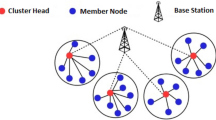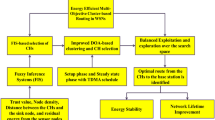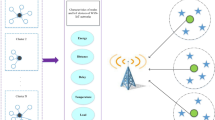Abstract
Nowadays, wireless energy charging (WEC) is emerging as a promising technology for improving the lifetime of sensors in wireless rechargeable sensor networks (WRSNs). Using WEC, a mobile charger (MC) reliably supplies electric energy to the sensors. However, finding an efficient charging schedule for MC to charge the sensors is one of the most challenging issues. The charging schedule depends on remaining energy, geographical and temporal constraints, etc. Therefore, in this article, a novel efficient charging algorithm is proposed, such that the lifetime of the sensors in WRSN are increased. The proposed algorithm uses a multi-node MC that can charge multiple sensors at the same time. In this algorithm, the charging requests of the low-energy sensors are received by the MC. Then, a reduced number of visiting points are determined for the MC to visit them. The visiting points are within the charging range of one or more requesting sensors. Thereafter, an efficient charging schedule is determined using an adaptive fuzzy model. Sugeno-fizzy inference method (S-FIS) is being used as a fuzzy model. It takes remaining energy, node density, and distance to MC, as network inputs for making real-time decisions while scheduling. Through simulation experiments, it is finally shown that the proposed scheme has higher charging performance comparing to base-line charging schemes in terms of survival ratio, energy utilization efficiency, and average charging latency. In addition, ANOVA tests are conducted to verify the reported results.














Similar content being viewed by others
References
Akyildiz IF, Su W, Sankarasubramaniam Y, Cayirci E (2002) A survey on sensor networks. IEEE Commun Mag 40(8):102–114
Anderson-Cook CM (2004) Regression and ANOVA: an integrated approach using SAS software. Am Stat 58(2):172
Baranidharan B, Santhi B (2016) DUCF: distributed load balancing unequal clustering in wireless sensor networks using fuzzy approach. Appl Soft Comput 40:495–506
Basu S, Pramanik S, Dey S, Panigrahi G, Jana DK (2019) Fire monitoring in coal mines using wireless underground sensor network and interval type-2 fuzzy logic controller. Int J Coal Sci Technol 6:1–12
Chiu SL (1994) Fuzzy model identification based on cluster estimation. J Intell Fuzzy Syst 2(3):267–278
Diallo O, Rodrigues JJPC, Sene M (2012) Real-time data management on wireless sensor networks: a survey. J Netw Comput Appl 35(3):1013–1021
Dong Y, Wang Y, Li S, Cui M, Hao W (2019) Demand-based charging strategy for wireless rechargeable sensor networks. ETRI J 41(3):326–336
García-Hernández CF, Ibarguengoytia-Gonzalez PH, García-Hernández J, Pérez-Díaz JA (2007) Wireless sensor networks and applications: a survey. IJCSNS Int J Comput Sci Netw Secur 7(3):264–273
He L, Zhuang Y, Pan J, Xu J (2010) Evaluating on-demand data collection with mobile elements in wireless sensor networks. In: 2010 IEEE 72nd vehicular technology conference - fall, Ottawa, ON. IEEE, pp 1–5. https://doi.org/10.1109/VETECF.2010.5594515
He S, Chen J, Jiang F, Yau DKY, Xing G, Sun Youxian (2012) Energy provisioning in wireless rechargeable sensor networks. IEEE Trans Mob Comput 12(10):1931–1942
He L, Kong L, Gu Y, Pan J, Zhu T (2014) Evaluating the on-demand mobile charging in wireless sensor networks. IEEE Trans Mob Comput 14(9):1861–1875
He L, Kong L, Tao J, Xu J, Pan J (2018) On-demand mobile data collection in cyber-physical systems. Wirel Commun Mob Comput 2018:5913981. https://doi.org/10.1155/2018/5913981
Herrera-Viedma E et al (2015) Fuzzy sets and fuzzy logic in multi-criteria decision making. The 50th anniversary of Prof. Lotfi Zadeh’s theory: introduction. Technol Econ Dev Econ 21(5):677–683
Jiang L, Xiaobing W, Chen G, Li Y (2014) Effective on-demand mobile charger scheduling for maximizing coverage in wireless rechargeable sensor networks. Mob Netw Appl 19(4):543–551
Kachuee M, Kiani MM, Mohammadzade H, Shabany M (2016) Cuffless blood pressure estimation algorithms for continuous health-care monitoring. IEEE Trans Biomed Eng 64(4):859–869
Kaswan A, Tomar A, Jana PK (2018) An efficient scheduling scheme for mobile charger in on-demand wireless rechargeable sensor networks. J Netw Comput Appl 114:123–134
Khan F, Memon S, Jokhio IA, Jokhio SH (2015) Wireless sensor network based flood/drought forecasting system. In: 2015 IEEE SENSORS, Busan. IEEE, pp 1–4. https://doi.org/10.1109/ICSENS.2015.7370354, ISBN:978-1-4799-8203-5
Khelladi L, Djenouri D, Rossi M, Badache N (2017) Efficient on-demand multi-node charging techniques for wireless sensor networks. Comput Commun 101:44–56
Koosheshi K, Ebadi S (2019) Optimization energy consumption with multiple mobile sinks using fuzzy logic in wireless sensor networks. Wirel Netw 25(3):1215–1234
Kumar N, Dash D (2020) Flow based efficient data gathering in wireless sensor network using path-constrained mobile sink. J Ambient Intell Human Comput 11(3):1163–1175
Kurs A, Karalis A, Moffatt R, Joannopoulos JD, Fisher P, Soljačić M (2007) Wireless power transfer via strongly coupled magnetic resonances. Science 317(5834):83–86
Kurs A, Moffatt R, Soljačić M (2010) Simultaneous mid-range power transfer to multiple devices. Appl Phys Lett 96(4):044102
La Rosa R, Livreri P, Trigona C, Di Donato L, Sorbello G (2019) Strategies and techniques for powering wireless sensor nodes through energy harvesting and wireless power transfer. Sensors 19(12):2660
Liang W, Wenzheng X, Ren X, Jia X, Lin X (2016) Maintaining large-scale rechargeable sensor networks perpetually via multiple mobile charging vehicles. ACM Trans Sens Netw 12(2):1–26
Liang W, Xu Z, Xu W, Mao G, Das SK, Liang W, Xu Z, Xu W, Shi J, Shi J et al (2017) Approximation algorithms for charging reward maximization in rechargeable sensor networks via a mobile charger. IEEE/ACM Trans Netw 25(5):3161–3174
Lin C, Zhou J, Guo C, Song H, Wu G, Obaidat MS (2017) TSCA: a temporal-spatial real-time charging scheduling algorithm for on-demand architecture in wireless rechargeable sensor networks. IEEE Trans Mob Comput 17(1):211–224
Linden D (1984) Handbook of batteries and fuel cells. McGraw-Hill, New York
Lingkun F, Cheng P, Gu Y, Chen J, He T (2015) Optimal charging in wireless rechargeable sensor networks. IEEE Trans Veh Technol 65(1):278–291
Lyu Z, Wei Z, Pan J, Chen H, Xia C, Han J, Shi L (2019) Periodic charging planning for a mobile WCE in wireless rechargeable sensor networks based on hybrid PSO and GA algorithm. Appl Soft Comput 75:388–403
Ma Y, Liang W, Wenzheng X (2018) Charging utility maximization in wireless rechargeable sensor networks by charging multiple sensors simultaneously. IEEE/ACM Trans Netw 26(4):1591–1604
Madhja A, Nikoletseas S, Raptis TP (2015) Distributed wireless power transfer in sensor networks with multiple mobile chargers. Comput Netw 80:89–108
Maksimović M, Vujović V, Milošević V (2014) Fuzzy logic and wireless sensor networks—a survey. J Intell Fuzzy Syst 27(2):877–890
Mehrabi A, Kim K (2016) General framework for network throughput maximization in sink-based energy harvesting wireless sensor networks. IEEE Trans Mob Comput 16(7):1881–1896
Meier U (2006) A note on the power of fisher’s least significant difference procedure. Pharm Stat J Appl Stat Pharm Ind 5(4):253–263
Miller SJ (2006) The method of least squares, vol 114. Mathematics Department Brown University, Providence
Muduli L, Jana PK, Mishra DP (2018) Wireless sensor network based fire monitoring in underground coal mines: a fuzzy logic approach. Process Saf Environ Prot 113:435–447
Nikoletseas S, Raptis T, Souroulagkas A, Tsolovos D (2017) Wireless power transfer protocols in sensor networks: experiments and simulations. J Sens Actuator Netw 6(2):4
Phoemphon S, So-In C, Niyato DT (2018) A hybrid model using fuzzy logic and an extreme learning machine with vector particle swarm optimization for wireless sensor network localization. Appl Soft Comput 65:101–120
Porwal G (2012) Wireless energy transfer. US Patent 8,175,660
Prabha VR, Latha P (2017) Fuzzy trust protocol for malicious node detection in wireless sensor networks. Wirel Pers Commun 94(4):2549–2559
Prabhu B, Boselin SR, Pradeep M, Gajendran E (2017) Enhanced battlefield surveillance methodology using wireless sensor network. A Multi J Sci Res Educ 3(1). https://ssrn.com/abstract=2905672
Ransing RS, Rajput M (2015) Smart home for elderly care, based on wireless sensor network. In: 2015 international conference on nascent technologies in the engineering field (ICNTE), Navi Mumbai. IEEE, pp 1–5. https://doi.org/10.1109/ICNTE.2015.7029932, ISBN:978-1-4799-7263-0
Ricci CP (2019) Multi-mode rechargeable electric vehicle. US Patent 10,183,584
Shih H-C, Ho J-H, Liao B-Y, Pan J-S (2013) Fault node recovery algorithm for a wireless sensor network. IEEE Sens J 13(7):2683–2689
Takagi T, Sugeno M (1985) Fuzzy identification of systems and its applications to modeling and control. IEEE Trans Syst Man Cybern 1:116–132
Tamandani YK, Bokhari MU (2016) SEPFL routing protocol based on fuzzy logic control to extend the lifetime and throughput of the wireless sensor network. Wirel Netw 22(2):647–653
Tian M, Jiao W, Liu J, Ma S (2019) A charging algorithm for the wireless rechargeable sensor network with imperfect charging channel and finite energy storage. Sensors 19(18):3887
Tomar A, Muduli L, Jana PK (2019) An efficient scheduling scheme for on-demand mobile charging in wireless rechargeable sensor networks. Pervasive Mob Comput 59:101074
Tsoumanis G, Oikonomou K, Aïssa S, Stavrakakis I (2018) A recharging distance analysis for wireless sensor networks. Ad Hoc Netw 75:80–86
Wang C, Guo S, Yang Y (2016) An optimization framework for mobile data collection in energy-harvesting wireless sensor networks. IEEE Trans Mob Comput 15(12):2969–2986
Xia JJ, Ng WB, Masuda H (2013) Wireless energy transfer system. US Patent App. 13/674, 301
Xie L, Shi Y, Hou YT, Lou W, Sherali HD, Midkiff SF (2014) Multi-node wireless energy charging in sensor networks. IEEE/ACM Trans Netw 23(2):437–450
Yang Y, Wang C (2015) Wireless rechargeable sensor networks. Springer, Berlin
Zadeh LA (1965) Fuzzy sets. Inf Control 8(3):338–353
Zhu J, Feng Y, Liu M, Chen G, Huang Y (2018) Adaptive online mobile charging for node failure avoidance in wireless rechargeable sensor networks. Comput Commun 126:28–37
Author information
Authors and Affiliations
Corresponding author
Additional information
Publisher's Note
Springer Nature remains neutral with regard to jurisdictional claims in published maps and institutional affiliations.
Rights and permissions
About this article
Cite this article
Kumar, N., Dash, D. & Kumar, M. An efficient on-demand charging schedule method in rechargeable sensor networks. J Ambient Intell Human Comput 12, 8041–8058 (2021). https://doi.org/10.1007/s12652-020-02539-1
Received:
Accepted:
Published:
Issue Date:
DOI: https://doi.org/10.1007/s12652-020-02539-1




